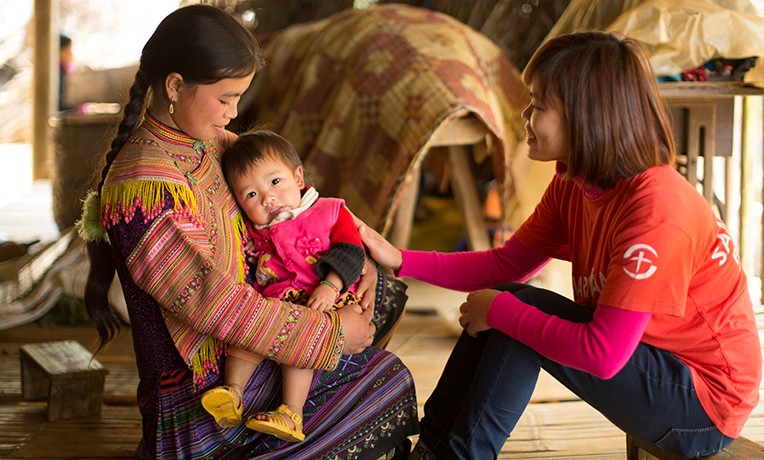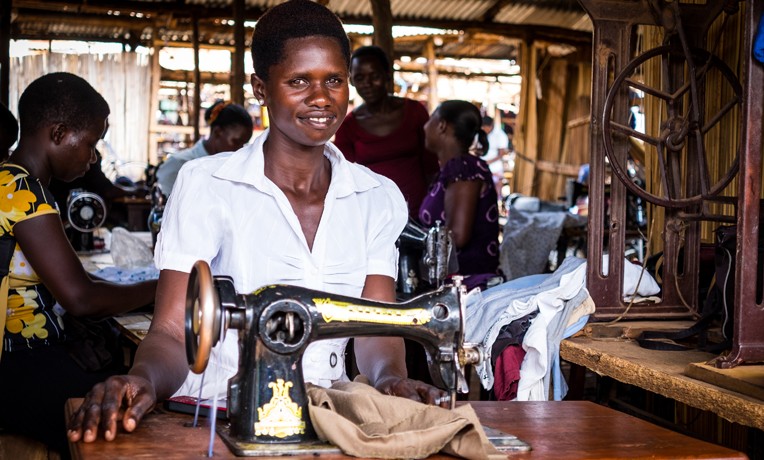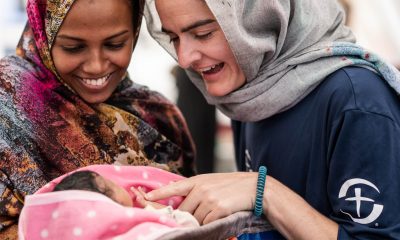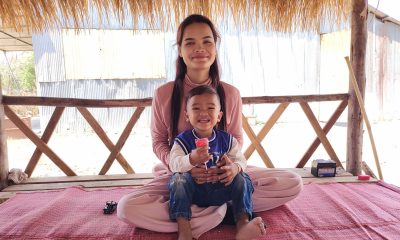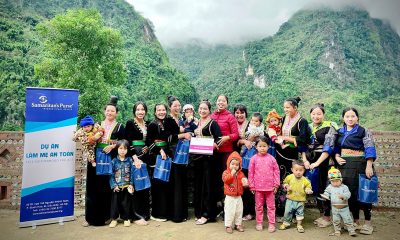Molly found new life through the love of a local church
Molly Adongo has always been tough—by necessity. She grew up in a small village in the northern Ugandan district of Lira. She doesn’t have any memories of her parents; she only knows that they died when she was young. Molly was raised by an older stepsister who mistreated her. If she felt like Molly hadn’t worked hard, she would withhold her food.
At the age of 15, Molly said enough was enough and fled to the city. She saw the military as a way to provide for herself, so she joined the Uganda People’s Defense Force.
In 2000, the Lord’s Resistance Army—the rebel group led by Joseph Kony—entered northern Uganda. Molly was on the front lines defending her homeland. In 2004, she was shot in battle—once in the leg and once in the arm.
After being discharged from the hospital, Molly went back to fighting with her military company until she became pregnant and was placed on maternity leave. The situation was not ideal, but Molly was overjoyed with the thought of being a mother. She wasn’t worried about single-parenting because she knew that she would be able to provide for her child with her army salary.
However, the army cut off Molly’s pay shortly after she went on leave. She tapped into her savings, but that money quickly ran out. Molly then tried to find the father of her baby, hoping that he could help her financially. She learned that he had been sent to fight in Somalia and was killed in battle.
When Molly’s baby boy, Jerrod, was born, they ended up living in an internally displaced persons settlement in Lira. She had no money and little food to care for him. The camp did its best to help, but sometimes there simply wasn’t enough to go around.
A Desperate Decision
One day, an older woman came to Molly and asked her, “Do you want to know a way to provide for your child?” Anxiously, Molly said yes and followed the woman out of the camp to downtown Lira. They entered a dimly lit bar, and the older woman introduced Molly to some men. She told Molly to go with a certain man and that he would give her money. It didn’t take long for her to realize that she was being asked to sell her body.
Molly didn’t want this life for herself, but she was desperate to care for her child and get out of the settlement. She told herself that this “career” in commercial sex work would be brief, but it became more ensnaring and oppressing than she ever imagined. Men started paying Molly in drinks instead of in money; her diet sometimes consisted solely of alcohol. This didn’t help feed Jerrod, so she gave him to a close relative while she worked to save enough money to get their lives together.
Molly never knew where she would sleep each night. Sometimes the men would let her stay in their homes or hotels, but most of the time they threw her out. She worked day and night.
“My life was never easy,” she said.
The work was also dangerous. Molly bears defensive wounds on her forearms from a night when a man beat her with a broken beer bottle after she demanded payment.
Molly continued to use drugs and alcohol to numb herself from the emotional and physical pain of her work. She believed in God, but she didn’t think He was with her because of how difficult her life had become.
Breaking Barriers
One night in the bar, a group of church members showed up to talk to the sex workers. Molly kept her distance at first. Churchgoers never came into the bar, so she was suspicious of their intentions. She heard them talking about Christ and how Jesus loved the prostitute just like He loved everyone else. She had heard the Word of God on radio programs and decided in that moment that maybe she should give these people a chance and follow them to church.
The believers were a part of the 10 churches in Lira district that were trained by the Samaritan’s Purse My Sister’s Keeper project. They had learned how to work with and minister to vulnerable women and girls who had been sexually exploited.
Formerly, the churches in this area didn’t accept commercial sex workers regardless of why they were pulled into prostitution. When the church members looked at them, they only saw women who ruined marriages and didn’t belong to the church.
One of the church members named Eunice admitted that before this program, she thought prostitutes were unreachable by God.
“I saw them as people who were not manageable, people who could not change and couldn’t be accepted by God,” she said.
Rose, another congregant trained by Samaritan’s Purse, said that she used to pray to God and ask Him to kill prostitutes because they were the “worst of sinners” and the “worst people God created.”
The training helped many church leaders see that they were making a mistake by chasing these women away, and that, in fact, seeking and saving the lost was Jesus’ core mission. As He said, “Those who are well have no need of a physician, but those who are sick. I did not come to call the righteous, but sinners, to repentance” (Mark 2:17, NKJV).
Since the training, Pastor Paivis of Lira said that he has realized how “God can use [former prostitutes/sex workers] as mighty weapons and tools to do His work.”
An Enduring Hope
After meeting the church members, Molly started attending church every Sunday as well as weekly discipleship classes facilitated by the trained staff.
“I was encouraged,” she said.
Her new hope was soon tested when she became gravely ill. Molly was bedridden for weeks. One day, her pastor and other members of the congregation came and touched her head while praying over her. Suddenly, Molly began to regain her strength. Within a few days, she was walking and eating again. From that point forward, Molly fully believed in God.
While she was on the mend, some of the congregants took Molly to the clinic and found out that she is HIV positive. She is now on medication and able to manage her condition.
To further support Molly, the My Sister’s Keeper project at her church helped her start a tailoring business with her own sewing machine and fabric. She no longer works on the street. Instead, Molly now spends her days making beautiful dresses. Her business has flourished, and Jerrod (now 10 years old) has returned to live with her.
“The tailoring work allows me to buy meals, pay school fees for my child, and helps pay rent,” Molly said. She also expressed how she experiences the Lord’s presence on a daily basis.
Her church as a whole has benefited by learning how to extend grace to those they had once shunned. Through this project, many churches in Lira and Kampala now know how to reach out to vulnerable women and value them as sisters in Christ.
Pastor Daniel, a participant in Kampala, said his involvement in the My Sister’s Keeper project has widened his perspective on the Gospel and removed barriers between the church and commercial sex workers.
“The wall that was between us has been broken down,” he said.
Brenda, Pastor Daniel’s wife, summed up their ministry: “Our job is to love them.”
Samaritan’s Purse partners with local churches worldwide to bring compassionate care to those who are suffering. The My Sister’s Keeper project in Uganda is one example of how we are helping our brothers and sisters share the Gospel and transform lives to the glory of God.
